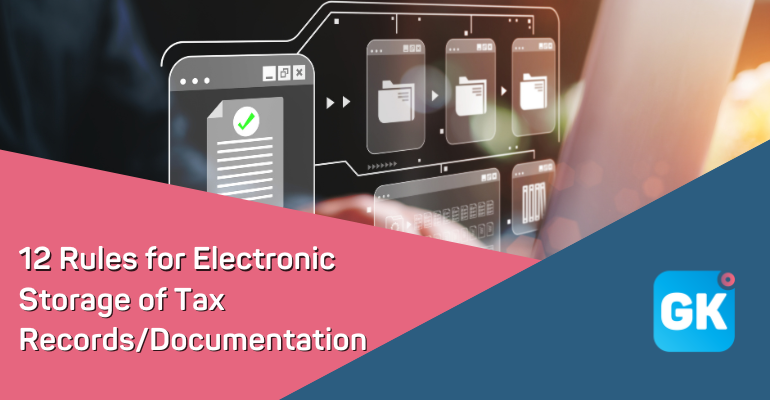12 Rules for Electronic Storage of Tax Records/Documentation

12 Rules for Electronic Storage of Tax Records/Documentation
In Ireland, the Revenue Commissioners provide guidelines for the electronic storage of tax records and documentation. Here are the key rules to consider:
- All electronically stored records must be held complete, unaltered and uncorrupted and must be retained for the appropriate period(s) of time specified by Revenue in relation to keeping of records.
- Where business records are generated, recorded or stored in any electronic format, those records must be retained for the minimum period required by the Acts. The retention alone of paper copies of documents or reports, which were generated, recorded or stored electronically, at any time, will not satisfy the requirements of the Acts to maintain records.
- The requirement to retain the paper original of any third-party record (for example invoices, statements, etc) is not necessary where an electronic copy of the original record is generated, recorded and stored in accordance with these requirements.
- If any third party record is received, transmitted or communicated electronically in the first instance, details are to be maintained by the sender/receiver of the form of encryption, digital signature or any other method used to verify the integrity of the record and the identity of the sender/receiver and how and where this is stored on the system (e.g. location on system, file name, passwords, etc.) for subsequent verification by Revenue, if necessary.
- If a record is not an original, this should be recorded. If the original of a record is of too poor a quality to be scanned, or the colour or ink is such that legible scanned images might not be produced, and a photocopy is used instead, this should be recorded and the original record (and its photocopy) retained. If the original contains physical changes that would not be visible on the scanned image or a reproduction, it should also be retained.
- There should be a clear audit trail within the system to cover scanning, batch details, indexing, problems arising during processing of records, the time and date of such processing, the name of the processor and other relevant information.
- Subject to the time limits governing the keeping of records, records must be accessible to inspection by a Revenue official at all reasonable times
- The capability must be available to produce exact copies of any electronically stored record for the full period that such record is required to be maintained.
- All electronically stored records must be accessible to a Revenue official in paper or electronic form. The method of delivery and the format of the electronic record required by the Revenue official shall be specified by the Revenue official at the time the records are being requested.
- Where new computer systems or applications are introduced the person to whom the records relate must ensure that the old systems and/or applications are maintained for such period as ensures that the records are retained for the minimum period required by the Revenue unless specific approval has been obtained from Revenue to discontinue support for the old systems and/or applications.
- The generation and storage of additional paper copies of records which have been generated electronically by the business itself or which were originally received in electronic format is not required.
- The person to whom the records relate must be able to sign any reproductions as “true copies” (that is, that they are authentic, accurate and complete). They must also be able to certify that:
– The stored records were not damaged or interfered with in any way
– Proper security procedures were in place to prevent tampering
– Programs are in place which will reproduce accurately the documents which are stored, and
– A proper systems audit takes place annually to ensure that the instructions on the use of the system have been followed correctly and are in accordance with operational requirements.
Get in Touch:
If you are interested in finding out how we can help your business, please book a no obligation call.


